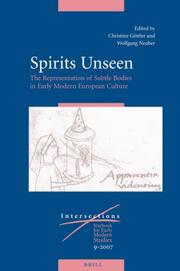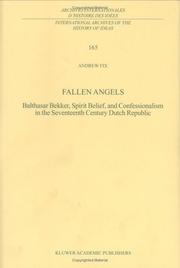| Listing 1 - 6 of 6 |
Sort by
|
Book
ISBN: 1607324903 160732489X 9781607324904 9781607324898 Year: 2016 Publisher: Logan : Utah State University Press,
Abstract | Keywords | Export | Availability | Bookmark
 Loading...
Loading...Choose an application
- Reference Manager
- EndNote
- RefWorks (Direct export to RefWorks)
"Seven oni stories from medieval Japan, translated for an English-speaking audience. In Japanese culture, oni are ubiquitous supernatural creatures, some great and some small, some mischievous, others dangerous, who play important roles in literature, lore, and folk belief"--Provided by publisher.
Spirits. --- Supernatural. --- Legends --- Folklore --- Demonology --- Folk-lore, Japanese --- Religion --- Miracles --- Invisible world --- Supernatural --- Fear of spirits
Book
ISBN: 9780874217933 0874217938 9786613078087 0874217946 1283078082 9780874217940 9781283078085 9780874219487 0874219485 6613078085 Year: 2010 Publisher: Utah State University, University Libraries
Abstract | Keywords | Export | Availability | Bookmark
 Loading...
Loading...Choose an application
- Reference Manager
- EndNote
- RefWorks (Direct export to RefWorks)
Oni, ubiquitous supernatural figures in Japanese literature, lore, art, and religion, usually appear as demons or ogres. Characteristically threatening, monstrous creatures with ugly features and fearful habits, including cannibalism, they also can be harbingers of prosperity, beautiful and sexual, and especially in modern contexts, even cute and lovable. There has been much ambiguity in their character and identity over their long history. Usually male, their female manifestations convey distinctively gendered social and cultural meanings. Oni appear frequently in various arts and media.
Spirits. --- Invisible world --- Folk-lore, Japanese --- Supernatural. --- Legends --- Folklore --- Demonology --- Powers (Christian theology) --- Supernatural --- Fear of spirits --- Religion --- Miracles --- Spirits

ISBN: 1281937118 9786611937119 9047423593 9789047423591 9004163964 9789004163966 9781281937117 6611937110 Year: 2008 Publisher: Leiden ; Boston : Brill,
Abstract | Keywords | Export | Availability | Bookmark
 Loading...
Loading...Choose an application
- Reference Manager
- EndNote
- RefWorks (Direct export to RefWorks)
Spirits – airy, volatile ‘subtle bodies' – occupied a central place in early modern European culture. At the edge of the visible and perceptible, spiritus could signify a broad variety of subtle substances, both natural and divine: the vapours moving inside the body, the elements of air and fire, angels, demons and spectres, the Holy Spirit and the human soul. Spirits functioned as intermediaries between two opposite worlds with continually shifting borders. This book investigates specific meanings and uses of spiritus in a variety of early modern disciplines and fields – physiology, psychology, alchemy, theology, demonology, art theory, music theory, novels and the literature on love – thus revisiting the ambivalent history of a central ancient concept in a period of crisis and change. Contributors include: Wietse de Boer, Sven Dupré, Jennifer Frangos, Axel Christoph Gampp, Christine Göttler, Berthold Hub, Dawn Morgan, Wolfgang Neuber, Bret Rothstein, Rose Marie San Juan, Wilhelm Schmidt-Biggemann, Justin E. H. Smith, Paul J. Smith, Thijs Weststeijn, and Sarah F. Williams.
Geesten. --- Verbeelding. --- Erscheinungen. --- Geist. --- Geisterglaube. --- Gespenst. --- Spuk. --- Unsichtbarkeit. --- Vision. --- Spirits --- Invisible world --- Supernatural --- Fear of spirits --- History. --- Europa (geografie) --- Europe --- Civilization.

ISBN: 0792358767 9048152852 9401715319 Year: 1999 Volume: 165 Publisher: Dordrecht ; Norwell, MA : Kluwer,
Abstract | Keywords | Export | Availability | Bookmark
 Loading...
Loading...Choose an application
- Reference Manager
- EndNote
- RefWorks (Direct export to RefWorks)
Dutch Reformed pastor Balthasar Bekker (1634-1698) has long been recognized as a key figure in the end of the witchcraft persecutions in early modern Europe. With the publication of his monumental four-volume work The World Bewitched Bekker argued against the temporal activity of the devil and evil spirits as well as against the reality of witchcraft, sorcery, and spirit possession. Yet Bekker's ideas drew opposition from Dutch Reformed clergymen who charged that his use of Cartesian philosophy to reject the temporal activity of spirits threatened much of traditional religious faith. This book argues that it wa Bekker's exegesis of biblical passages in which spirits and spirit activity were mentioned that was a far greater threat than his Cartesian metaphysics to the literal interpretation of the Bible which was the intellectual cornerstone of Dutch reformed confessionalism, dominant in the church since the Synod of Dordrecht (1618-1619). With an examination of the ideas of Bekker, his opponents and supporters, this book places the controversy around The World Bewitched within the context of the Cartesian debates of the seventeenth century and the growth of confessionalism within the Dutch Reformed church.
Spirits --- Esprits --- History of doctrines --- Histoire des doctrines --- 17e siècle --- Bekker, Balthasar, --- Nederlandse Hervormde Kerk --- Doctrines --- History --- -Invisible world --- Powers (Christian theology) --- Supernatural --- Fear of spirits --- -Bekker, Balthasar --- -NHK --- Nederlandsch Hervormde Kerk --- Netherlands Reformed Church --- Dutch Reformed Church --- Protestantse Kerk in Nederland --- -History --- -Spirits --- -History of doctrines --- -Doctrines --- 17e siècle --- Invisible world --- NHK --- Bekker, Balthazar --- 17th century --- Religion. --- History. --- Modern philosophy. --- Philosophy of mind. --- Religious Studies, general. --- History, general. --- Modern Philosophy. --- Philosophy of Mind. --- Mind, Philosophy of --- Mind, Theory of --- Theory of mind --- Philosophy --- Cognitive science --- Metaphysics --- Philosophical anthropology --- Modern philosophy --- Annals --- Auxiliary sciences of history --- Religion, Primitive --- Atheism --- Irreligion --- Religions --- Theology --- Spirits. --- Becker, Balthasar --- Bekker (balthasar) --- Pays-bas --- Eglises reformees --- Confession de la foi --- Vie religieuse --- 17e siecle --- Histoire
Book
ISSN: 15709434 ISBN: 9789004171527 9004171525 9786612400407 1282400401 9047424840 9789047424840 9781282400405 6612400404 Year: 2009 Volume: 123 Publisher: Leiden Boston : Brill,
Abstract | Keywords | Export | Availability | Bookmark
 Loading...
Loading...Choose an application
- Reference Manager
- EndNote
- RefWorks (Direct export to RefWorks)
The central theme of this volume is to re-examine the received concepts and images of ghosts in various religious cultures ranging from the Ancient Near East and Egypt to the Old Testament, the Classical Era, Early Medieval and Early Modern Europe, Early India, and Medieval China. As a religious phenomenon, the realm of ghosts has been less studied than the realm of the divine. Through a collaborative effort by scholars from different disciplines, this volume proposes a multi-cultural approach to construct a wider and complicated picture of the phenomenon of ghosts and spirits in human societies and to have a grasp of the various problems involved in understanding the phenomenon of ghost.
Ghosts --- Spirits --- Religions --- Ghosts. --- Spirits. --- Religions. --- 291.21 --- 291.21 Onderwerp van de godsdienst: goden en geesten; aanbidding; godensagen --- Onderwerp van de godsdienst: goden en geesten; aanbidding; godensagen --- Comparative religion --- Denominations, Religious --- Religion, Comparative --- Religions, Comparative --- Religious denominations --- World religions --- Civilization --- Gods --- Religion --- Invisible world --- Powers (Christian theology) --- Supernatural --- Fear of spirits --- Phantoms --- Specters --- Spectres --- Apparitions --- Haunted places --- Fantômes --- Esprits --- Congresses --- Congrès --- Congresses. --- Ghosts - Congresses --- Spirits - Congresses --- Religions - Congresses
Book
ISBN: 1282772473 9786612772474 0520942671 9780520942677 0520253612 9780520253612 0520253620 9780520253629 9780520253612 9780520253629 Year: 2009 Publisher: Berkeley : University of California Press,
Abstract | Keywords | Export | Availability | Bookmark
 Loading...
Loading...Choose an application
- Reference Manager
- EndNote
- RefWorks (Direct export to RefWorks)
Water sprites, mountain goblins, shape-shifting animals, and the monsters known as yôkai have long haunted the Japanese cultural landscape. This history of the strange and mysterious in Japan seeks out these creatures in folklore, encyclopedias, literature, art, science, games, manga, magazines, and movies, exploring their meanings in the Japanese cultural imagination and offering an abundance of valuable and, until now, understudied material. Michael Dylan Foster tracks yôkai over three centuries, from their appearance in seventeenth-century natural histories to their starring role in twentieth-century popular media. Focusing on the intertwining of belief and commodification, fear and pleasure, horror and humor, he illuminates different conceptions of the "natural" and the "ordinary" and sheds light on broader social and historical paradigms-and ultimately on the construction of Japan as a nation.
Animals, Mythical --- Supernatural. --- Spirits. --- Invisible world --- Supernatural --- Fear of spirits --- Religion --- Miracles --- Creatures, Fabled --- Fabled creatures --- Fabulous animals --- Fabulous creatures --- Fantastic animals --- Fictitious animals --- Imaginary animals --- Legendary animals --- Mythical animals --- Zoological mythology --- Animals --- Dragons --- Mythology --- Japan --- al-Yābān --- Giappone --- Government of Japan --- Iapōnia --- I︠A︡ponii︠a︡ --- Japam --- Japani --- Japão --- Japon --- Japonia --- Japonsko --- Japonya --- Jih-pen --- Mư̄ang Yīpun --- Nihon --- Nihon-koku --- Nihonkoku --- Nippon --- Nippon-koku --- Nipponkoku --- Prathēt Yīpun --- Riben --- State of Japan --- Yābān --- Yapan --- Yīpun --- Zhāpān --- Япония --- اليابان --- يابان --- 日本 --- 日本国 --- Spirits --- J1723.80 --- J1723 --- J4120 --- J4150 --- J5620 --- Japan: Religion in general -- demonology --- Japan: Religion in general -- primitive religions -- general popular beliefs and folk religion --- Japan: Sociology and anthropology -- social psychology and social-cultural phemomena --- Japan: Sociology and anthropology -- customs, folklore and culture --- Japan: Literature -- folk tales, fairy tales, mukashibanashi, ghost stories --- Japan: Sociology and anthropology -- social psychology and social-cultural phenomena --- Jepun --- Yapon --- Yapon Ulus --- I︠A︡pon --- Япон --- I︠A︡pon Uls --- Япон Улс --- ayakashi. --- belief. --- commodification. --- demons. --- east asian cultural studies. --- horror. --- human electricity. --- humor. --- japan. --- japanese cultural imagination. --- japanese culture. --- japanese folklore. --- kanji. --- kokkuri. --- malevolent. --- mamono. --- minzokugaku. --- mischievous. --- mizuki shigeru. --- modernity. --- mononoke. --- monsters. --- mountain goblins. --- natural history. --- shape shifting animals. --- spirits. --- spooky stories. --- supernatural monsters. --- toriyama sekien. --- water sprites. --- yokai.
| Listing 1 - 6 of 6 |
Sort by
|

 Search
Search Feedback
Feedback About
About Help
Help News
News